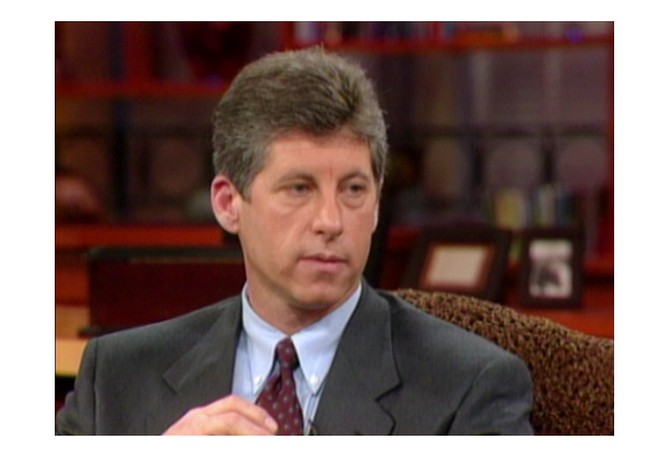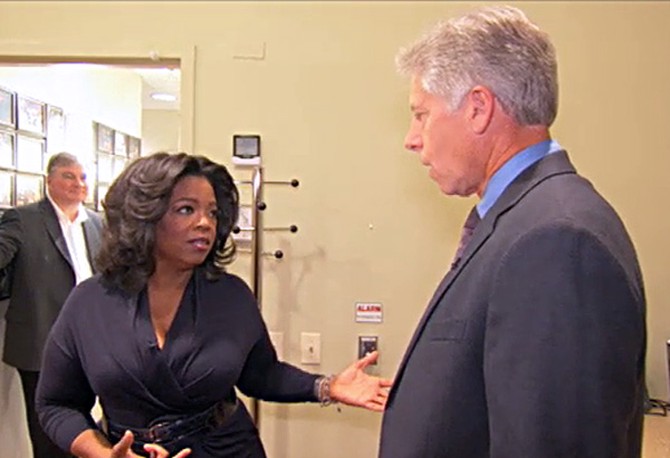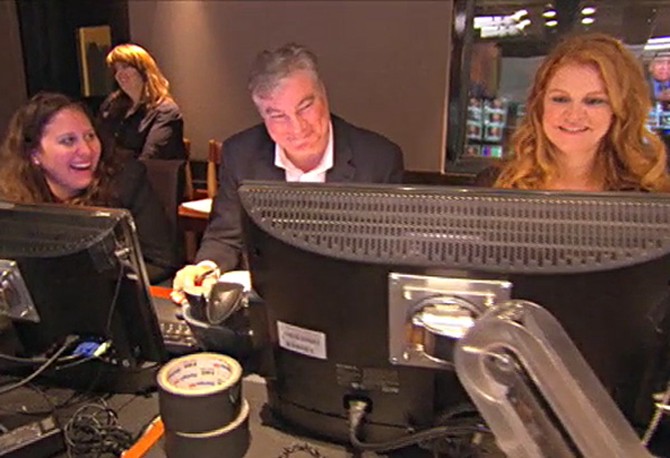Mark Fuhrman's Final Oprah Show Appearance

O.J. Simpson's iconic 1995 trial and acquittal on charges of murdering his ex-wife, Nicole Brown Simpson, and her friend Ron Goldman, was one of the most unforgettable stories of the decade.
One of the key players in this real-life soap opera was Los Angeles Police Department detective Mark Fuhrman. Under oath, Mark denied ever having used the N-word, but tapes revealed that he was lying. The defense seized on this lie as part of their strategy to create enough doubt in the minds of the jurors about the evidence to lead to a not guilty verdict.
Oprah first interviewed Mark in 1997. Now, she'd like to have him as one of her Season 25 guests. "I wanted to talk to Mark Fuhrman again because it's fascinating to me how one single decision that a person makes can affect the rest of your life," she says. "So I wanted to be able to talk to Mark Fuhrman just to see all these years later what happened to his life."
One of the key players in this real-life soap opera was Los Angeles Police Department detective Mark Fuhrman. Under oath, Mark denied ever having used the N-word, but tapes revealed that he was lying. The defense seized on this lie as part of their strategy to create enough doubt in the minds of the jurors about the evidence to lead to a not guilty verdict.
Oprah first interviewed Mark in 1997. Now, she'd like to have him as one of her Season 25 guests. "I wanted to talk to Mark Fuhrman again because it's fascinating to me how one single decision that a person makes can affect the rest of your life," she says. "So I wanted to be able to talk to Mark Fuhrman just to see all these years later what happened to his life."

Senior supervising producer Jill and senior producer Terry are assigned to this booking—and there's one major roadblock in getting Mark to agree to appear. "Mark doesn't want to talk about race," Terry says. "It's like Greg Brady not wanting to talk about The Brady Bunch."
During a phone call with Jill's team, Mark won't budge. "I just don't want to waste my time," he says. "I have wasted 15 years of my life on that crap."
Listen in on the phone call
"To find out Mark's on the fence, that was a little shocking," Jill says. "And then to know we told Oprah about it and now to be like, 'We don't know if we have him.' That wasn't good."
During a phone call with Jill's team, Mark won't budge. "I just don't want to waste my time," he says. "I have wasted 15 years of my life on that crap."
Listen in on the phone call
"To find out Mark's on the fence, that was a little shocking," Jill says. "And then to know we told Oprah about it and now to be like, 'We don't know if we have him.' That wasn't good."

Two days before taping, Jill can go into her pre-show meeting with Oprah bearing good news. "Mark was a bit of a tough booking but we stuck to our guns," she says. "We spent the last few weeks calling Mark Fuhrman, and he said yes."
During the pre-show meeting, Jill tells Oprah about Mark's reluctance to discuss race. "We've had a lot of conversations with him and he's not coming on the show to defend himself about being a racist," Jill says. "He's been there, he's done that. He's apologized to you. He's apologized to the human race."
Oprah still thinks race needs to be part of the conversation. "The truth is you can't have Mark Fuhrman on without talking about race, racism and O.J. Simpson," Oprah says. "But I also understand his reluctance to do so. Because if you're looking at him as a man, a human being, a father, a husband, a citizen of his community, whatever it is he's now doing, he's trying to move on with his life."
Above all, Oprah wants the show to connect with the audience. "So it's not just his story," Oprah says. "That it becomes about a pivotal moment in your life. You can't take it back. And that moment changes the trajectory of your life forever."
Jill has some thinking to do. "We have to figure out how's this going to work and everyone's going to walk away happy."
During the pre-show meeting, Jill tells Oprah about Mark's reluctance to discuss race. "We've had a lot of conversations with him and he's not coming on the show to defend himself about being a racist," Jill says. "He's been there, he's done that. He's apologized to you. He's apologized to the human race."
Oprah still thinks race needs to be part of the conversation. "The truth is you can't have Mark Fuhrman on without talking about race, racism and O.J. Simpson," Oprah says. "But I also understand his reluctance to do so. Because if you're looking at him as a man, a human being, a father, a husband, a citizen of his community, whatever it is he's now doing, he's trying to move on with his life."
Above all, Oprah wants the show to connect with the audience. "So it's not just his story," Oprah says. "That it becomes about a pivotal moment in your life. You can't take it back. And that moment changes the trajectory of your life forever."
Jill has some thinking to do. "We have to figure out how's this going to work and everyone's going to walk away happy."

The morning of taping, Jill suggests Oprah stops by the greenroom to greet Mark before the show. "I don't go and talk to the guests beforehand," Oprah says. "I have found that people end up saying things to you in the private moment, [so] that when you try to get them to say it again on camera they feel like they're repeating themselves. So I don't like to do that unless I feel the guest needs some reassurance. Unless I need to be clear about intention. "
When Oprah and Mark meet again, Mark says he's clear about what the show will bring. "I think that they should know that they got a half of a story," he says.
But five minutes before taping, Jill is still nervous that Oprah will go places Mark isn't comfortable with. "He had some definite hesitations about some of the things that Oprah would talk about, but he can't come and then [say], 'No comment' and 'I'm not answering that question,'" she says. "He has got to give the interview that is worthy of Season 25. So it all hinges on if Mark comes to play."
When Oprah and Mark meet again, Mark says he's clear about what the show will bring. "I think that they should know that they got a half of a story," he says.
But five minutes before taping, Jill is still nervous that Oprah will go places Mark isn't comfortable with. "He had some definite hesitations about some of the things that Oprah would talk about, but he can't come and then [say], 'No comment' and 'I'm not answering that question,'" she says. "He has got to give the interview that is worthy of Season 25. So it all hinges on if Mark comes to play."

The interview begins, and Oprah goes exactly where Mark hoped she wouldn't. "I could tell he was feeling anxious about it, now that I'm stepping into it," Oprah says. "[He's] basically going around and around and around saying nothing, trying not to say what he really was feeling. Because he's afraid that he's gonna open up that door again."
Mark's vague answers begin throwing Oprah off. "I am watching him sort of flailing all over the place," Oprah says. "He just said a couple sentences and I'm off track. I don't know where he is."
Executive producer Sheri calls for a break so Mark can collect his thoughts. Oprah decides to continue on. "It is my job to help that person articulate what it is I know they're trying to express," Oprah says.
Mark's vague answers begin throwing Oprah off. "I am watching him sort of flailing all over the place," Oprah says. "He just said a couple sentences and I'm off track. I don't know where he is."
Executive producer Sheri calls for a break so Mark can collect his thoughts. Oprah decides to continue on. "It is my job to help that person articulate what it is I know they're trying to express," Oprah says.

Finally, Oprah breaks the ice by telling Mark about her O.J. Simpson dream. In her dream, Oprah interviews O.J. and O.J. confesses. "Then all of a sudden Oprah gets in her groove," Sheri says. "Mark settles down. He can hear the question. He's answering it from his heart. It's more internal. And now you're watching a conversation."
The rest of the interview takes off from there. "Oprah doesn't do interviews with boundaries. She kept going there and going there and I have to say Mark handled it beautifully and he went with it and he had really good answers," Jill says. "It's funny, what he feared the most I think ended up being one of the most interesting interviews he's ever done and maybe one of the best things he's done for his career."
See what Mark said about life after the O.J. trial
Oprah is also pleased with the outcome. "I don't want anyone to feel disrespected. I don't want anybody to feel uncomfortable," Oprah says. "But in the end, I thought it was great because the truth in any form will set you free. I thought it was great."
Inside Oprah's final Favorite Things
The rest of the interview takes off from there. "Oprah doesn't do interviews with boundaries. She kept going there and going there and I have to say Mark handled it beautifully and he went with it and he had really good answers," Jill says. "It's funny, what he feared the most I think ended up being one of the most interesting interviews he's ever done and maybe one of the best things he's done for his career."
See what Mark said about life after the O.J. trial
Oprah is also pleased with the outcome. "I don't want anyone to feel disrespected. I don't want anybody to feel uncomfortable," Oprah says. "But in the end, I thought it was great because the truth in any form will set you free. I thought it was great."
Inside Oprah's final Favorite Things
Published 02/04/2011

